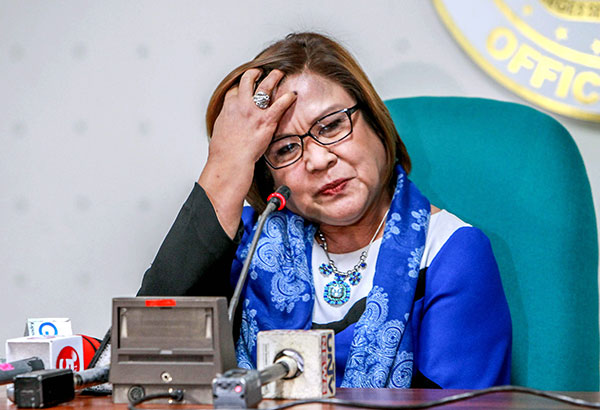 |
The cases of Sen. Leila De Lima were raffled off to Muntinlupa Regional Trial Court's three branches.
The STAR/File/By Rosette Adel
|
MANILA, Philippines — The Muntinlupa Regional Trial Court (RTC) has assigned the three cases of Sen. Leila De Lima to its three branches.
De Lima’s cases, filed by the Department of Justice in connection with the illegal drug trade inside the New Bilibid Prison, were separately raffled to Branches 204, 205 and 206 at around 1 p.m. This is to determine the probable cause or a possible consolidation of the cases since there are similar respondents.
Muntinlupa RTC Vice Executive Judge Antonietta Medina led the raffling of cases. Criminal Cases No. 165, 166 and 167 were raffled to Judges Juanita Guerrero, Amelia Fabros-Corpuz and Patricia Manalastas-De Leon, respectively.
The three judges will also determine the issuance of a warrant of arrest against the senator within the day or the coming days. If arrest would be granted, De Lima may face detention without bail.
However, Branch 204 handled by Guerrero, could not issue an arrest warrant on Monday since the judge was on leave since Friday. She is expected to report to work by Tuesday.
To counter the drug cases raffled, De Lima’s camp filed a motion to quash before Branch 206 over the lack of jurisdiction. The Court of Appeals has denied the senator’s temporary restraining order on the same arguments.
For De Lima, the cases filed by the Justice department were “procedurally wrong based on existing laws and jurisprudence.” She said if the merits were true, it should have been filed before the Ombudsman and not on a regional trial court.
“Sinadya nila mapunta ‘yan sa court para makakuha agad ng arrest warrant. It’s quite a stretch na non-bailable,” De Lima said in a televised ambush interview.
The senator also clarified that her counter motions including the motion to quash and omnibus motion were meant to be filed after her cases were raffled to a particular branch and were readied by her legal counsel pre-hand. She denied anew that the allegations filed against her were true.
The motion to quash was described to ask the court to render a previous ruling of that court or lower judicial body null or invalid. On the other hand, reference.com defines omnibus motion as “an application by a defendant asking the court to examine a case from certain legal aspects.”
De Lima and seven other respondents were accused of violating Section 5 in relation to Section 26 (B) and Section 28 (criminal liability of government officials and employees) of Republic Act 9165 or the Comprehensive Dangerous Drugs Act of 2002.
Muntinlupa RTC Vice Executive Judge Antonietta Medina led the raffling of cases. Criminal Cases No. 165, 166 and 167 were raffled to Judges Juanita Guerrero, Amelia Fabros-Corpuz and Patricia Manalastas-De Leon, respectively.
The three judges will also determine the issuance of a warrant of arrest against the senator within the day or the coming days. If arrest would be granted, De Lima may face detention without bail.
However, Branch 204 handled by Guerrero, could not issue an arrest warrant on Monday since the judge was on leave since Friday. She is expected to report to work by Tuesday.
To counter the drug cases raffled, De Lima’s camp filed a motion to quash before Branch 206 over the lack of jurisdiction. The Court of Appeals has denied the senator’s temporary restraining order on the same arguments.
For De Lima, the cases filed by the Justice department were “procedurally wrong based on existing laws and jurisprudence.” She said if the merits were true, it should have been filed before the Ombudsman and not on a regional trial court.
“Sinadya nila mapunta ‘yan sa court para makakuha agad ng arrest warrant. It’s quite a stretch na non-bailable,” De Lima said in a televised ambush interview.
The senator also clarified that her counter motions including the motion to quash and omnibus motion were meant to be filed after her cases were raffled to a particular branch and were readied by her legal counsel pre-hand. She denied anew that the allegations filed against her were true.
The motion to quash was described to ask the court to render a previous ruling of that court or lower judicial body null or invalid. On the other hand, reference.com defines omnibus motion as “an application by a defendant asking the court to examine a case from certain legal aspects.”
De Lima and seven other respondents were accused of violating Section 5 in relation to Section 26 (B) and Section 28 (criminal liability of government officials and employees) of Republic Act 9165 or the Comprehensive Dangerous Drugs Act of 2002.

No comments:
Post a Comment